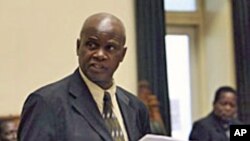Zimbabwean officials made a plea to Western governments and international organizations on Wednesday to resume direct aid to the southern African country. But, the United Nations and the United States seem to be happy with the current arrangements.
At a meeting, Zimbabwean Finance Minister Patrick Chinamasa said that aid to Zimbabwe is currently “fragmented,” as not all of it is being channeled to prop up the country’s ailing economy.
"When development assistance is received by us, we have an obligation to say thank you, because it is filling a financial gap. I can’t say thank you when I do not know where the finances have gone and whether we need it. And whether it is playing a transformative role in our economy," said Chinamasa.
Western countries stopped direct funding to Zimbabwe's government in 2002 when they slapped its leadership with targeted sanctions for alleged election-rigging. Since then, foreign aid to Zimbabwe has gone through United Nations agencies and other aid organizations.
At the meeting Wednesday, U.N. resident coordinator in Zimbabwe Bishow Parajuli said a lot has been achieved using this system, including a 33 percent drop in maternal mortality, an increase in the immunization rate, and reducing mother-to-child transmission of HIV by more than half.
"Within these continued efforts, we are aiming to support and address some major and persistent challenges remaining with a stubbornly high rate of poverty at 63 percent and 76 percent in rural areas and help build resilience to more firmly address the root causes of poverty and inequality, other challenges," said Parajuli.
The U.S. government and other Western countries have cited several factors for their refusal to give aid through the government. These include controversial economic policies, fears of corruption, and widely documented human rights violations by President Robert Mugabe's government.
U.S. Ambassador to Zimbabwe Bruce Wharton was among many Western dignitaries that attended the meeting with Chinamasa. Afterward, he explained what the U.S. would like to see before resuming direct aid.
"We think that the foundation for everything is the rule of law. Secondly, I think the implementation of the new constitution. Third, we think that clear respect for private property is absolutely crucial to make the economy going again. Fourth and finally, a very clear and transparent investment framework so that someone who is thinking of investing in Zimbabwe knows what the rules are with great clarity and can count on those rules being the same next week or next year," said Wharton.
The U.S. is the leading provider of humanitarian assistance to Zimbabwe. Through the U.S. Agency for International Development (USAID), President's Emergency Plan for AIDS Relief (PEPFAR) and the Centers for Disease Control and Prevention (CDC), In Zimbabwe, the U.S. funds food aid, HIV/AIDS prevention programs, and programs to promote democracy, good governance and economic growth.
Last year alone, USAID provided nearly $25 million in emergency food aid.
